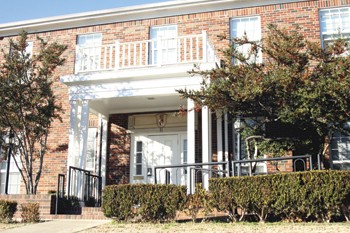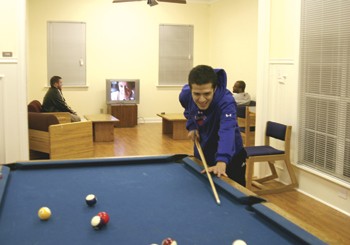
Residence Life and Student Housing is now using the former Beta house as a living space for 10 former Shuttles residents. (Marissa Trevino)
When Beta Theta Pi was closed by the fraternity’s national organization on Dec. 10, 2005, because of violations of risk management policies and poor academic performance, the future of the Beta house, lying in the heart of fraternity row, was uncertain. Only at the end of last semester, when 10 Shuttles refugees were left in need of a home as every available place of residence on campus was filled, did Residence Life and Student Housing finally figure out what to do with the vacant former fraternity house-at least for this semester.
“The Beta House was available so we were looking at options for it,” Residence Life and Student Housing director Doug Hallenbeck said. “There were ten or so Shuttles students that had only signed up for semester contracts, but that indicated at the end of the semester that they would like to live with us.”
The students seeking housing for the spring were asked at the end of the fall semester if they would like to move into the former fraternity house, now referred to as the co-op house.
“I was waiting for them to tell me where I was going to live and it wasn’t until that last day that they asked me ‘Do you want to live at the co-op house?'” sophomore Rene Garcia said. “I was surprised and excited, because of the fact that it’s a house so it has more space and is more comfortable.”
Ten students, all male, moved into the house at the beginning of the semester, filling the five-room house to its capacity.
According to Christian Yao, assistant director for Residential Life for Apartments and Greeks, some of the students were hesitant about moving into the former Beta House, but changed their minds once they saw it.
“The house has a basketball court, dining room, was remodeled recently, freshly painted and in really good shape,” Yao said. “I feel like it’s working out well.”
In addition to the basketball court and dining room, the house also features a lounge, a pool table and a kitchen.
Resident Homero Guerrero is enjoying the quiet of the house and Garcia said he liked the change in atmosphere.
“A lot more happens on this part of campus, and there’s the athletic fields right across the street,” Garcia said.
Although residents have expressed positive sentiments about living in the house, it is possible that such a living situation may not be available to students after this semester.
Hallenbeck said that the house may be put to use as the site for the RLSH offices during the renovations to Boaz Hall next year, but it is possible that the house could be turned in to a co-op eventually.
“We’d like to see another Service House-type mentality, the same programmatic themes,” Hallenbeck said.
Cooperative student housing, which traditionally is operated by its residents and provides an option for low cost housing, arose in the 1930s when the Michigan Socialist House was founded near the University of Michigan campus. Co-ops now exist at universities across the country.
According to the University of Texas Inter-Cooperative Council Web site the students who live in the houses own the organization and manage it, and the houses operate with members cooperating daily, doing a certain amount of chores at the house and interacting positively with the each other.
Although the former Beta house is technically not a co-op, as it is owned by the university, the house has adopted some aspects of the cooperative living tradition. The residents of the house, for example, are self-governing as there is no RLSH staff member living in the house. The students have also become a close-knit group.
“It’s a smaller community so you’re familiar with all the faces,” sophomore Homero Guerrero said. “So if anything comes up there’s usually someone around that will help you out.”

Sophomore Homero Guerrero plays billiards in the lounge of the former Beta house, now a co-op living space for 10 former Shuttles residents. (James Bilowus)








